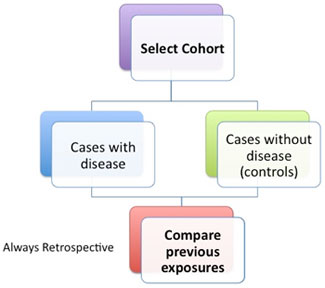Types of Epidemiology Studies - page 3
2. Case Control Studies: "Why me" study.
In case control studies investigators begin with people who have been diagnosed as having a disease (cases) and compare them to people without the disease (controls).
Using data from a variety of sources - personal interviews, medical and hospital records - cases and controls are compared with regard to past exposures in an attempt to identify differentiating factors.
- Similarities with historical cohort studies
Both types of studies take a look backward in time for exposures that may be
related to disease.
- Differences with historical cohort studies
Sample size






